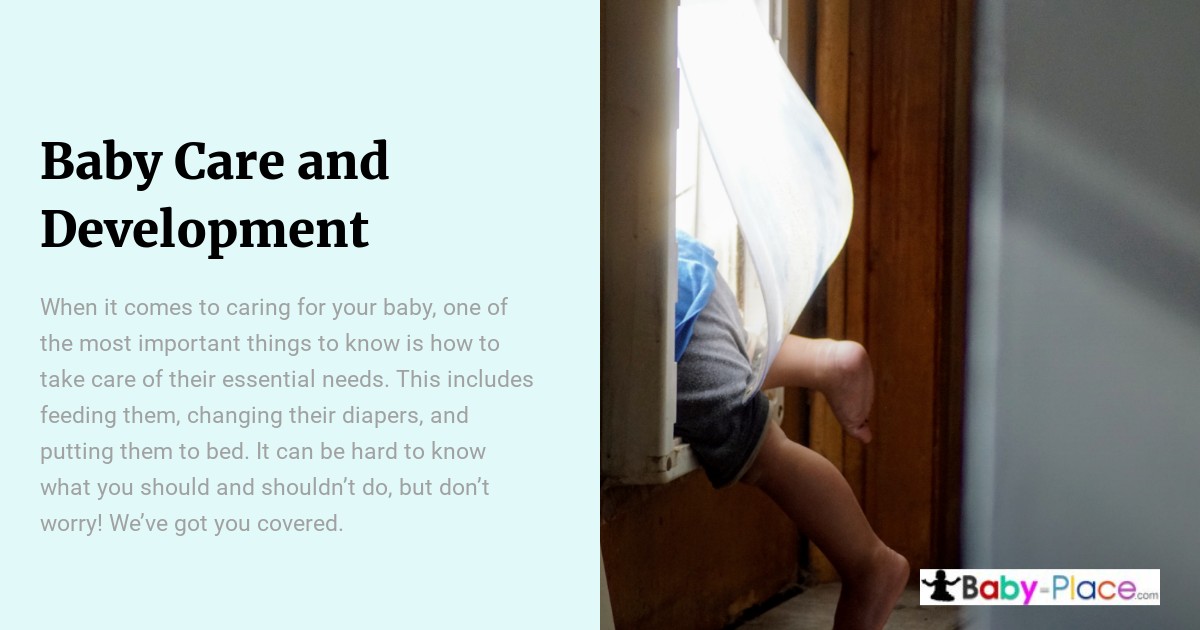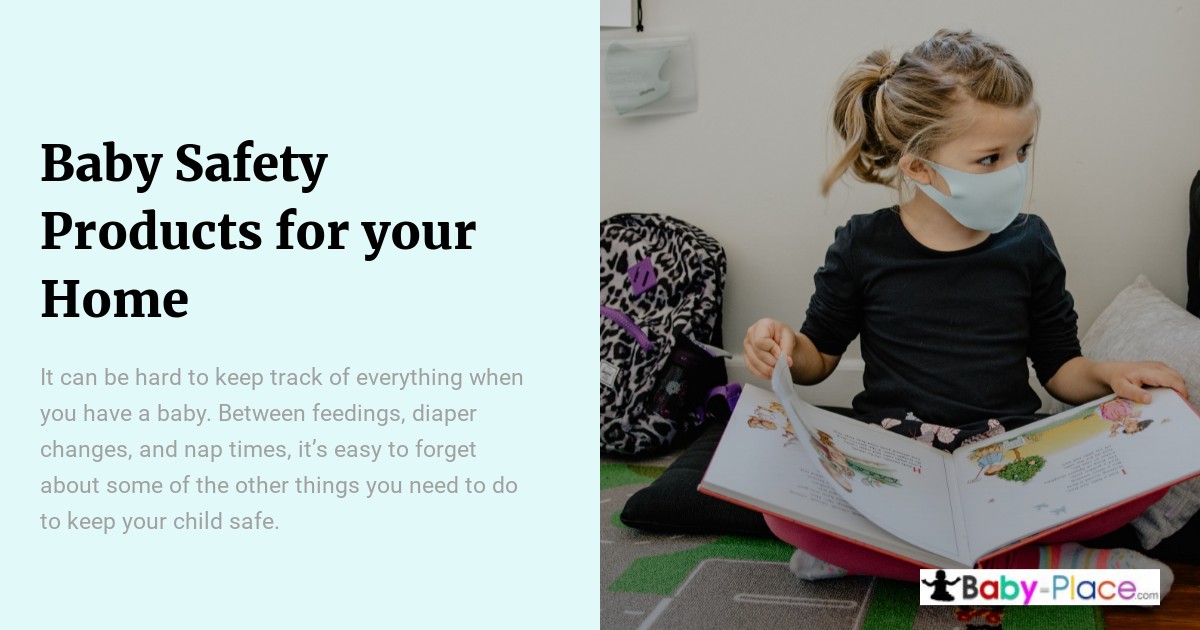
What is Caring for Your Baby All About?
When it comes to caring for your baby, one of the most important things to know is how to take care of their essential needs. This includes feeding them, changing their diapers, and putting them to bed. It can be hard to know what you should and shouldn’t do, but don’t worry! We’ve got you covered.
One of the most important things to remember when caring for your baby is meeting its basic needs. This means making sure they are fed, changed, and comfortable. You should also ensure you provide them with plenty of love and affection. Caring for a baby can be a lot of work, but it is worth it when you see them smiling and happy.
How to Feed Your Baby?
One of the most important things you will do as a parent is feed your baby. There are a few different ways to do this, including breastfeeding, bottle feeding, and using a formula. Breastfeeding is the healthiest way for your baby to eat, but not everyone can do this. If you can’t or don’t want to breastfeed, you can use a formula or bottle feed them.
You will need a bottle, formula, and water to bottle feed your baby. You will also need to sterilize all of your bottles and nipples before each use. You can use a sterilizer or boil them in water for five minutes to sterilize them.
When you are ready to bottle feed your baby, make sure the formula is at the right temperature-it should be lukewarm. Fill the bottle with formula and slowly pour it into your baby’s mouth. Make sure to burp your baby after each feeding.
Pumping Breast Milk: How and When to Pump?
If you’re breastfeeding your baby, you may need to pump breast milk at some point.
Here are a few tips on how and when to pump:
When to pump: You may want to start pumping breast milk about a month after giving birth or when your baby begins to feed less frequently. Some women pump breast milk every time they nurse their baby, while others only pump occasionally. It’s up to you what works best for you and your baby.
How to pump: To pump breast milk, use a breast pump – either manual or electric. Place the flange (the part that goes over your nipple) over your breast and press down on the handle to create a vacuum. You should see or hear the milk start to flow. Pump for about 10-15 minutes, or until you have expressed as much milk as possible.
Storing and freezing breast milk: Once you’ve pumped breast milk, you can keep it in either bottles or bags. Label each container with the date and time it was pumped. Breast milk can be stored in the fridge for four days or in the freezer for three months.
Thaw frozen breast milk by placing it in the fridge overnight or using a microwave-safe container and defrosting it in the microwave. Always test the temperature of the milk before giving it to your baby.
How to Burp Your Baby?
Burping a baby is essential in preventing gas buildup and stomach discomfort.
Here are a few steps to burp your baby:
- Position your baby so that the chin rests on your shoulder and your hand supports the baby’s back.
- Gently rub or pat your baby’s back until he or she burps.
- If your baby doesn’t burp after a few minutes, switch positions and try again.
- Continue to Burp your Baby until he or she shows signs of being comfortable and done with the process.
Here are a few additional tips for burping your baby:
- Sit the baby up straight rather than leaning them over your shoulder. This will help open up their airway and make it easier to burp them.
- If the baby is fussing or seems uncomfortable, try another method of burping them. Some babies prefer to be rubbed on the back, while others do better with gentle pressure on their tummy.
- If the baby spits up after being burped, don’t worry. This is common and usually doesn’t cause any problems.
How to Get Your Baby On a Feeding Schedule?
When establishing a feeding schedule, it’s essential to consult with your pediatrician to ensure that your baby is getting the appropriate caloric and nutritional intake. Most babies will eat every 2-3 hours during the day and usually sleep for about 4-5 hours at night.
Here are some tips for getting your baby on a feeding schedule:
- Ensure that you nurse or formula feed your baby consistently each day.
- Try to avoid letting your baby sleep more than 4-5 hours at night, as this can throw off their feeding schedule.
- Wake your baby up if they haven’t been fed in more than 3 hours, so they don’t get too hungry and become difficult to feed.
- If your baby is eating solid foods, try introducing a new food every few days to avoid getting bored of their diet.
- Stick to the same routine each day – this will make it easier for both you and your baby to adjust.
How to Introduce Solid Foods to Your Baby?
There are a few different ways to introduce solid foods to your baby. You can start by mixing a small amount of food with breast milk or formula and gradually increase the amount of solid food as your baby gets used to it.
Another option is to give your baby pureed or mashed fruits and vegetables. Or you can just put some solid food on a spoon and let your baby try to eat it himself.
It’s essential to introduce solid foods slowly so that your baby’s digestive system has time to adjust. Start with one new food at a time and wait a few days before introducing another one.
If your baby has trouble digesting solids, stop feeding him that particular food and try again later. And always consult with your pediatrician before introducing solid foods to your baby.
Common Problems with Baby Feeding
There are a few common problems that can occur when feeding your baby, such as:
Gagging: Some babies gag when they first start to eat solid foods. This is usually nothing to worry about and usually subsides over time.
Reflux: Reflux occurs when stomach acid backs up into the esophagus and causes discomfort or vomiting. If your baby has reflux, consult with your pediatrician to find out the best way to treat it.
Diarrhea: Diarrhea can be caused by several things, such as bacteria, viruses, or changes in the baby’s diet. If your baby has diarrhea, try to give them electrolyte solutions to help replace lost fluids.
Constipation: Constipation is usually caused by a lack of fiber in the baby’s diet. If your baby is constipated, try adding more fruits and vegetables to their diet.
Colic: Colic is a condition that causes babies to cry for no apparent reason. There is no one cure for colic, but there are a few things you can do to help calm your baby, such as using a pacifier or white noise machine.
Sucking Reflex: Babies have a natural sucking reflex that helps them feed and soothe themselves. If your baby is fussy or has trouble falling asleep, try giving them a pacifier or thumb to suck on.
How to Bathe Your Baby?
Babies don’t need a lot of baths – just one or two a week is usually enough. And it’s best to bathe them in the evening so that they can relax and go to bed clean and fresh.
Here are the steps for bathing a baby:
- Fill a sink, basin, or bathtub with warm water and add a small amount of soap.
- Gently place your baby in the water and use a washcloth or sponge to wash his or her body. Avoid getting water in their eyes, nose, or ears.
- Rinse off all the soap and dry your baby’s body with a towel.
- Apply baby lotion to their skin to keep them hydrated.
- Wrap your baby in a towel and place him or her in a safe place to sleep.
It’s essential to ensure that your baby is completely dry before putting them to bed, as wetness can cause diaper rash.
How to Change Your Baby’s Diaper?
Another critical task for caring for your baby is changing their diapers. This can be a bit daunting, but it is worth it in the end. Before you change your baby’s diaper, make sure you have everything you need nearby. This includes diapers, wipes, a changing pad, and some clothes if you are going to change your baby’s clothes as well.
To change your baby’s diaper, first lay them down on their back on the changing pad. Remove their old diaper and then wipe them down with a wet wipe. If they are dirty, you can use the wet wipe to clean them off. After they are cleaned off, put on a new diaper and fasten it securely. Then you can stand them up and dress them in some new clothes.
How to Put Your Baby to Bed?
One of the most important things you will need to know when caring for your baby is putting them to bed. When it is time for your baby to go to bed, you will want to put them in a crib or bassinet. Ensure the room is dark and quiet and that there are no distractions.
To put your baby to bed, first lay them down on their back in the center of the crib or bassinet. Then, slowly and carefully lift their legs and insert one side of the diaper into the crib sheet. Pull the diaper up between their legs and attach it securely.
If you are using a blanket, make sure it is tucked in securely around them. Once they are all dressed and ready for bed, give them a kiss goodnight and turn off the light.
Ways You Can Help Your Baby Sleep Better at Night?
You can help your baby sleep better at night by establishing bedtime routines and following a regular bedtime schedule.
It’s essential to create a calming bedtime routine for your baby before sleep. This may include reading a book, singing a song, or bathing your baby. Try to keep the routine consistent each night and avoid exposing your baby to bright lights or screens in the hours leading up to bedtime.
Make sure your baby gets plenty of daytime naps, so they’re not overly tired when it’s time for bed. And try not to bring your baby into your bed during the middle of the night. This can make it harder for them to learn how to sleep through the night independently.
How to Tell If Something Is Wrong With Your Baby?
There are a few key things to look out for when it comes to signs that something may be wrong with your baby. One of the most important things is watching for changes in their normal behavior or routine. If your baby usually sleeps through the night but starts waking up more often, that could be a sign of trouble.
Likewise, if your baby was eating and gaining weight steadily but then stops gaining weight or even begins to lose weight, that could be cause for concern.
Other signs that something may be wrong include excessive crying, vomiting, diarrhea, seizures, and difficulty breathing. If you notice any of these symptoms in your child, it’s essential to seek medical help right away. Early diagnosis and treatment are crucial for the health of your baby.
When and How to Call the Doctor?
It’s always a good idea to consult with your pediatrician if you have any concerns about your baby’s health. But some general guidelines can help you determine when and how to call the doctor.
For instance, if your baby is younger than three months old and has a fever of 100.4 degrees or higher, you should call the doctor immediately. Likewise, if your baby is vomiting more than once in 24 hours, has diarrhea, is not drinking enough fluids, or has any other worrying symptoms, it’s best to call the doctor for advice.
In most cases, however, it’s safe to wait and see if the problem resolves itself before calling the doctor. If your baby is fussing more than usual, has a stuffy nose, or is just generally out of sorts, it’s probably nothing to worry about. But if the problem persists for more than a day or two, it’s best to call and get some advice from your pediatrician.
Tips on How to Soothe Your Crying Baby
It can be difficult to know what to do when your baby is crying.
Here are a few tips on how to soothe your crying baby:
- First, try to identify the cause of the crying. Is your baby hungry? Tired? Teething? Sick?
- If you can’t determine the cause of the crying, try some basic remedies such as changing the diaper, giving a bath, or offering a pacifier.
- If your baby is still crying, hold them close and comfort them. Sometimes babies need some love and reassurance.
- Make sure your baby isn’t too hot or too cold, and check to see if they’re in a safe place. Never leave your baby unattended, even for a few minutes.
- If your baby is still crying after trying these remedies, it’s best to consult with your pediatrician. There may be an underlying cause that requires medical attention.
So there you have it! Everything you need to know about taking care of your baby. We hope this guide was helpful and that you feel more confident in caring for your little one. Caring for a newborn can be challenging, but with these tips, you’re sure to be a pro in no time.
Frequently Asked Questions:
What are the essential needs of a baby that parents should focus on?
The essential needs of a baby include feeding them, changing their diapers, putting them to bed, and ensuring they receive plenty of love and affection. Meeting these basic needs ensures the baby is comfortable and happy.
What are the different ways to feed a baby?
There are a few different ways to feed a baby, including breastfeeding, bottle feeding, and using formula. Breastfeeding is the healthiest option, but if that's not possible, bottle feeding with formula is a good alternative. Always ensure bottles and nipples are sterilized before use.
How can I establish a feeding schedule for my baby?
To establish a feeding schedule, consult with your pediatrician to ensure proper caloric and nutritional intake. Most babies eat every 2-3 hours during the day and sleep for 4-5 hours at night. Consistency is key—nurse or formula feed at the same times each day and avoid letting your baby sleep too long without feeding.
What are some common problems that can occur when feeding a baby?
Common feeding problems include gagging, reflux, diarrhea, constipation, colic, and issues related to the sucking reflex. If any of these problems persist, consult your pediatrician for advice and treatment options.
How can I soothe a crying baby?
To soothe a crying baby, first identify the cause—hunger, tiredness, discomfort, etc. Try basic remedies like changing their diaper, offering a pacifier, or holding them close for comfort. If crying continues, check for signs of illness and consult a pediatrician if needed.



